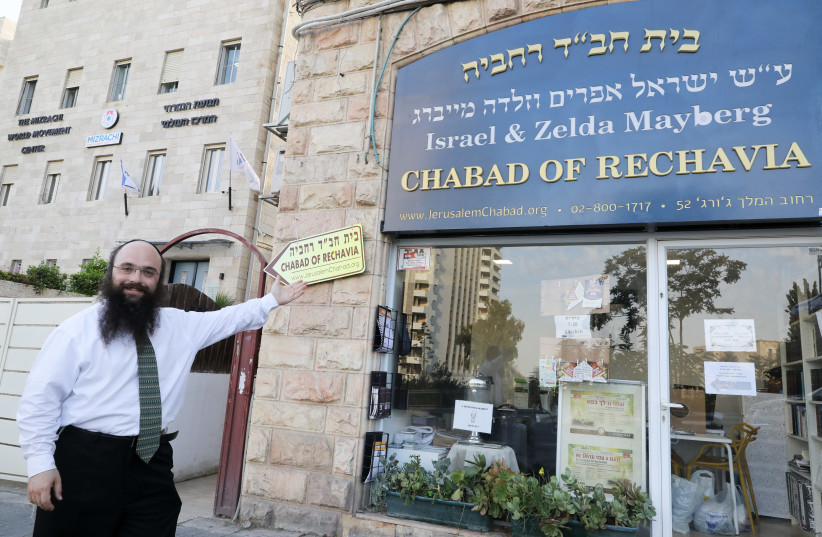
Rabbi Yisroel Goldberg, head of the Chabad of Rechavia, has been hard at work for years making a place for people to feel at home in the center of Jerusalem.
“If there’s one place that really needs a Chabad center, it’s right here in Rehavia,” he said.
Besides representing one of the world’s largest Jewish religious organizations in the Israeli capital, Goldberg is behind a unique Purim initiative: Azza Zaza.
Ahead of Purim, In Jerusalem sat down with Rabbi Goldberg to talk about his work at Chabad of Rechavia and his signature initiative.
How did you get to Chabad of Rechavia?
I came here around 14 years ago. The first year, we didn’t have a center. We did things from our homes or from local synagogues. In the summer of 2011, we opened our first center in the Windmill. A couple of years before COVID-19, we bought our current center, next to the Great Synagogue on King George Ave. In a couple of weeks, we’re going to move into our new location, on the corner of Keren Kayemet Le’Israel and Ussishkin streets.

Why is being a Chabad rabbi in Jerusalem so important?
If you think about it, there’s one place in the world that everyone wants to go to. Everybody comes to Jerusalem, everybody wants to be here; and when they’re here, they want to get closer. Jerusalem is the place. After the Kotel, what’s the next place that people go to – from a Jewish perspective – to spend time, to have an experience? It’s right here in Rehavia. You have the big shuls, the big international organizations – it’s really the place to be. It’s such a great privilege to be the representative of Chabad in the center of Jerusalem, which is the center of the world. That’s why I’m so determined to build such a large center. I believe that within a year or two, we’re going to have millions of people from around the world moving here because everyone sees how amazing and special Israel is. It’s a huge privilege for us to build an infrastructure that can help people feel at home.
Jerusalem has over 30 Chabad houses and over 60 Chabad rabbis. Every community in Jerusalem is covered. In Rehavia-Nahlaot, there are some 10,000 homes, and we have three rabbis. Some of the homes are obviously owned by our dear friends in the Diaspora. In most regular cities in the US or Europe, 10,000 Jewish homes would be spread out over a huge geographic area. Here, it’s all crunched into one square kilometer. The idea is you want Chabad houses for x amount of people.
Tell me about Azza Zaza. What is it?
Half a year into being here, I wanted to make an activity for Purim where people could feel at home, hear the Megillah [Esther] reading, receive mishloach manot [sending gifts], donate money to the poor, and have a seudat [festive meal] Purim. But I didn’t have a center at the time, so what could I do?
Azza Road has a bunch of restaurants, so I went to the kosher restaurant owners and made them an offer: I’d come and read the Megillah there and do the advertising for it, and they would set aside a time and space for Megillah reading, mishloach manot, and donating money. In return, I’d encourage the participants to buy their seuda there. Seven of them said yes.
I came up with the name Azza Zaza because it was on Azza Street, and zaza means “to rock,” and we rocked Azza Street. I thought it would be nice if five people came to each place. But it turned out to be such a major success that we had dozens of people in each place. The first year, the restaurants were jam-packed. Every year, we add more and more places. We added the restaurants on Keren Kayemet Le’Israel St. Then the next year, we added the ones on Bezalel St. Then we did Ginot and Nahlaot, which is very popular, with 100 to 200 people at every Megillah reading.
But you see people from different backgrounds, and the unity is so special. This is beautiful, this is a model for how Am Yisrael should be. I think it’s so important this year, more than any other year.
Where is Azza Zaza taking place this year?
That’s an interesting question. During COVID, we couldn’t do it in the restaurants. So for two years, we only did it in open areas. That led us to change things a bit. Now we have Azza Zaza in key locations around Rehavia, Nahlaot, Kiryat Shmuel, and Sha’arei Hessed, which is very convenient. We added new restaurants too, and some of them are on Azza. When we did some research beforehand about what people liked about Azza Zaza, many participants, especially non-religious people, said they liked that it was in restaurants, so we’re trying to keep that.■
To learn more, visit AzzaZaza.com
